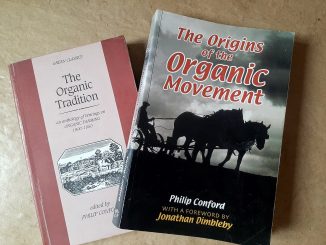Why should farmers consider community, cooperative approaches? What are the benefits to doing so – and what happens when more individualistic approaches are taken instead? In the first of our occasional contributions from Patrick Worms, this testing topic is grappled with. Patrick Worms trained as a molecular geneticist and is the Senior Science Policy Advisor of World Agroforestry (ICRAF) and the President of the European Agroforestry Federation. These rants however, are 100% Patrick’s own personal opinion, and are not necessarily the views of any of the organisations he works for or represents. Patrick’s Rants may have appeared elsewhere online previously. In this case, an earlier version of this rant first appeared on the Soil4Climate facebook group. You can follow Patrick on twitter.
Why consider co-ops, and /or co-operative community approaches to farming? The reasons are many and varied. They spread risks and opportunities, lower labour requirements, boost incomes and resilience, allow specialisation and optimise environmental management at landscape scales. This is a key reason why so many traditional agricultural management systems around the world were able to provide for their members sustainably over timescales ranging from centuries to millennia (as confirmed by modern archaeological methods).
Individual farmers, alone? Most are just… Prey.
Prey to market forces, to predatory lending, to impersonal corporations, and to the impossible ideal of having to be good at everything – at accounting and marketing and sales and cash flow management and procurement and administration and and and, in addition to the core job of growing things well.
This article speaks from the American experience, but I’ve noticed this in other countries where individualism is highly prized, such as the Czech Republic or Poland. These are the countries in Europe that are losing their family farms the fastest and rapidly moving to oligarchic control of the land (Bill Gates has nothing on the Czech PM Andrej Babiš, who grew himself the country’s biggest fortune by buying up much of its farmland). These are the countries where ecological simplification, which eventually leads to desertification, is moving fastest.
Farm-scale individualism is a key barrier to the proper ecological regeneration of landscapes, which demands the ripping up of fences and the resumption of the interaction between cropping, livestock and wildlife, including through large migrations (think Serengeti). Very few individual farms are large enough to do anything like that, but cooperatives can much more easily marshall the hundreds of thousands of acres required.
Elinor Ostrom, Nobel prize winner in economics for her work on community management, found and studied hundreds of examples around the world which were optimised not only for the benefit of its members, but also for ecosystem functioning.. Resilience and sustainability, at work, and working well.
The conclusion seems clear. Individualism is largely incompatible with a decent life as a farmer, and with sustainable land management at any scale beyond a few acres.
More on cooperative approaches to farming and rural areas
What’s so important about the middle? Cooperative action and values for family farm viability.
‘Too good to be true’ – The UK Co-op Helping New Entrants Get Access to Land
Rural Dialogues | Stochastic System Collapse Part 2 – the Social and Solidarity Economy Alternative
More on Babiš
Bad Czechs and Balances: Commission Audit Confirms Czech PM in Conflict of Interest
Czech Republic | COPA No Longer Defends Interests of Majority of Czech Farmers
Bad Czechs and Balances: Commission Audit Confirms Czech PM in Conflict of Interest







